FIFA Kicks Decision on Israel’s Settlement Soccer Teams To 2018
But Israel Will Have to Work Harder to Win the “Football War”
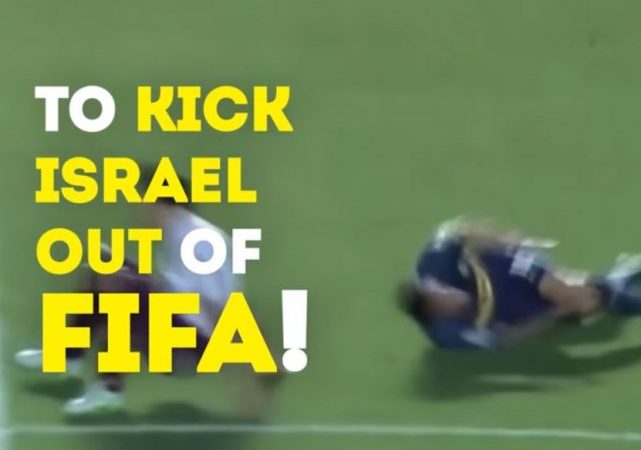
On Thursday May 11, at the 67th FIFA Congress in Manama, Bahrain the Palestinian Football Association (PFA) and its supporters of vehemently anti-Israel ‘human rights’ organizations lost their bid to sanction or suspend the Israel Football Association (IFA) from FIFA—the governing body of world soccer.
Eligible member associations voted 138-50 to approve the FIFA Council’s alternative proposed motion to delay the issue for one more year until March 2018.
I highlighted the persistent campaign against Israel at FIFA in a recent post, Will FIFA Kick Israel Out of World Football?
In this follow-up post, I provide a summary of the deliberations at the FIFA Congress this past week and analyses of the Council decision reached on May 9 and the Congress decision on May 11.
Also included is a synopsis of the dramatic Congress proceedings and the emotional speeches delivered by the head of the Palestinian Football Association Jibril Rajoub and his Israel Football Association counterpart Ofer Eini.
The upshot, as I argue further below, is that those working to hurt Israel’s standing in FIFA (as part of the larger effort to bring pressure to bear on the Jewish state in international forum) suffered a temporary setback.
The FIFA decisions this past week were an important accomplishment for Israel and are rightly viewed as BDS Fails.
But it would be wrong to conclude that Israel has now won the battle, having permanently kicked anti-Israel politics out of the soccer pitch. On the contrary, Israel will have to work even harder over the next 6 months to avoid looming FIFA discussions on the status of Palestinian territorial claims; to keep its own preferred solution in play; and to prevent a future crisis for its footballers.
Background: the Dispute Over Six “Settlement Soccer Teams”
As I discussed in my prior post, the crux of the long-running controversy pertains to the presence of six Israeli teams in Judea and Samaria/the West Bank all of which play in lower-level leagues. The PFA insists that they’re in breach of FIFA statutes and are playing on “stolen land” in “sovereign Palestinian territory.”
The IFA has countered that FIFA rules regarding member associations’ clubs playing on the territory of another member (i.e., Article 72.2 of the FIFA Statutes) don’t apply since the status of the West Bank is disputed, and it’s beyond FIFA’s purview to become a border demarcation body.
Here’s a short presentation that offers a useful summary of the controversy:
As I noted in the prior post, the PFA’s effort has been spearheaded by its terror-celebrating head, Palestinian Authority politician Jibril Rajoub.
In trying to target Israel from within FIFA, he’s been bolstered by the support of a number of NGOs affiliated with the global BDS movement arrayed against Israel, including PACBI (Palestinian Campaign for the Academic and Cultural Boycott of Israel), PSC (Palestinian Solidarity Committee), and the Palestinian BDS National Committee.
Other international organizations like Human Rights Watch (HRW), Avaaz, and the European Council on Foreign Relations, which have long supported BDS campaigns against Israel, have also joined the PFA’s campaign calling on FIFA to take punitive measures against Israel.
None of these groups have engaged in similar campaigns to denounce, expel, or otherwise punish other countries from FIFA for their alleged human rights violations, including playing teams on occupied territory.
Basically, they’re all working to create a discriminatory double standard for Israel.
On Thursday, Israel may have succeeded in persuading some member associations that the Palestinians are contradicting longstanding FIFA practice by politicizing the world sports organization in ways that could both tarnish its image and open up a can of worms by implicating other member associations playing for states that also have territorial disputes.
But as I argue below, a careful assessment of FIFA’s Council and Congress deliberations in fact shows that the matter is far from settled in Israel’s favor.
Israel will play! Thank you to @FIFAcom for keeping politics out of sports and rejecting the Palestinian proposition to politicize FIFA pic.twitter.com/KHVH84fXpP
— WJC (@WorldJewishCong) May 11, 2017
FIFA Council Recommends Delaying Decision on Israeli Settlement Football Teams
FIFA’s Council convened on Tuesday May 9 to discuss a number of topics to be deliberated and voted on by the 67th FIFA Congress on Thursday May 11.
Among the key decisions it took related to a report submitted by Tokyo Sexwale, the Chairman of the Monitoring Committee on Israel-Palestine, which I discussed in my prior post.
The Council’s decision was only one sentence long:
Following a report by chairman of the Monitoring Committee Israel-Palestine Tokyo Sexwale, the FIFA Council considered that at this stage it is premature for the FIFA Congress to take any decision.”
The decision removed the issue of Israel’s settlement clubs from the Congress agenda, but it wasn’t clear whether the celebratory mood the decision generated was fully warranted given that the issue could still be brought up before the Congress.
WJC President Lauder welcomes #FIFA Council’s move to defer decision on Israel’s football association https://t.co/JGw2VSwDEh #LetIsraelPlay pic.twitter.com/2qbzUqkiiu
— WJC (@WorldJewishCong) May 9, 2017
In fact, according to FIFA’s procedural rules, it was possible for the PFA to request during the Congress sessions that the body reject the Council’s decision and move to a vote on its own proposal.
This is indeed what the PFA tried to do during the Congress proceedings (see below).
As I noted in Wednesday’s LI morning newsletter, Rajoub was reportedly so furious that PM Benjamin Netanyahu had contacted the head of FIFA to register his opposition to the PFA’s maneuvers, that I thought he was very likely not going to let the matter drop.
As I predicted, at Thursday’s FIFA Congress the PFA’s motion was up for consideration. Both Rajoub and IFA Chairman Ofer Eini were invited to the stage to address the assembled delegates.
WATCH: FIFA Congress Hears Arguments on the Palestinian Proposal But Votes on the Council’s Alternative Motion
If you have the patience, the portion of the meeting of the 67th FIFA Congress which took up the issue of Israel’s soccer teams based in the West Bank is fascinating to watch.
It’s full of drama and tension, and provides a window into Palestinian anti-Israel animus in general, and Rajoub’s obsession with Israel’s alleged malevolence in particular.
FIFA has uploaded the entire 5.5 hour long Congress proceedings to YouTube. The parts of the meeting pertaining to the PFA vs. IFA standoff begin at roughly 3:27:28 and end at approximately 3:58:44.
Here’s the rundown and a summary of the highlights:
-
3:27:28—FIFA President Gianni Infantino turns to agenda item 14.3 (the Palestinian motion) and invites PFA President Jibril Rajoub to the stage
The Palestinian motion appears on screen calling for “official recognition of the Palestinian Football Association’s entitlements to all of its rights as described in the FIFA statutes.”
-
3:28:35—Rajoub is escorted to the podium
It took considerable time for Rajoub to actually reach the stage given the size of the hall. Suspense mounts.
-
3:28:36—Rajoub delivers his remarks (approx. 15 minutes)
Rajoub delivered a passionate speech to FIFA to oust Israel from the organization unless it removed its “settler teams.”
He’s actually a terrible speaker though.
After a salutation to the assembled delegates in Arabic, he launched into a rambling monologue in broken English, never once looking up from his notes. Much of his talk was repetitive and could have been shortened by half.
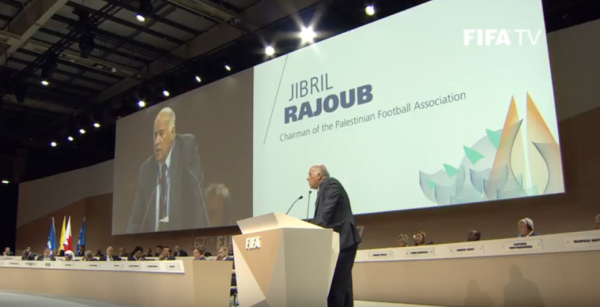
[Credit: YouTube screenshot]
- There have been too many delays, this being the 5th time that he’s brought the issue before the Congress;
- Consistent with Statute 72.2, FIFA shouldn’t be allowing or “funding games in occupied territory”;
- Israel’s settlement teams are playing on territory which has been “recognized as Palestinian” by the UN Security Council (he explicitly mentions UNSCR 2334 throughout)—“my right is to develop the game in my recognized borders”; and
- PM Netanyahu “scared” and “intimidated” the Council, a “political intervention” that should be investigated and lead to the IFA’s suspension.
Rajoub also made the convoluted argument that only by presenting the monitoring committee’s report (along with its recommendation that Israel should be granted 6 months to end all football-related activities in the West Bank or “face the consequences”) would FIFA be able to say it was effectively “removing itself out of politics.”
The final minutes of the speech, when Rajoub finally goes off-script is the best part and well-worth watching.
In them, he launches into a bizarre rant about his “suffering Palestinian footballers”, the “violation of human rights” posed by Israel’s “illegal” West Bank “football activities” and Israel’s “discrimination and violence against our people—24/7.”
There are over 170 Palestinian football clubs and sports organizations, so it’s difficult to know what Rajoub is talking about.
By the end he got so worked up that he was sputtering and nearly shouting nonsense at the audience (e.g., Israel is a “boy” that needs to be called by his rightful name (??).
-
3:42:21—Infantino calls IFA chief Ofer Eini to the stage
After Rajoub’s tirade, I think everyone was eager to hear Eini’s rebuttal—I know I was.
But it took so long for Eini to make his way to the podium that Infantino voiced concern that he wasn’t present in the plenary, only to correct himself (“I didn’t see you”). It was a weird and awkward moment and a less than auspicious start to Eini’s address.
-
3:43:11—Eini delivers his remarks (approx. 4 minutes)
After Rajoub’s histrionics, it was a pleasure to listen to Eini’s well-crafted remarks. To my mind, he delivered a competent address that was short and to the point. The problem is that he spoke entirely in Hebrew. As others have rightly noted, this was a major error on his part.
Israeli presentation was a disaster (and in Hebrew yet). Histadrut politio – wrong man at wrong time and in wrong place. Needs replacement
— Prof Gerald M Steinberg (@GeraldNGOM) May 11, 2017
By choosing not to speak in English, Eini created an unnecessary distance between himself and the assembled delegates. Speaking in Hebrew also meant that Eini was at the mercy of the translator who sometimes mangled his words. One blatant example was in Eini’s repeated reference to how soccer “can bring hearts together.” It was a lovely phrase in the Hebrew, but the translator kept saying “can bring people together”—technically OK, but not half as impactful.
Israel FA Ofer Eini has released a statement regarding FIFA Congress decision, translated to English. pic.twitter.com/9xpe4lvnyX
— Raphael Gellar (@Raphael_Gellar) May 11, 2017
Still, Eini did flag a number of important points for the assembled member associations:
- FIFA cannot establish the political borders of its members and none of the delegates (except “maybe Rajoub who is a government official”) have this authority;
- Stopping six “teams of children” from playing football won’t help to “resolve Palestinian problems”; and
- Football must be played everywhere in the interest of peace.
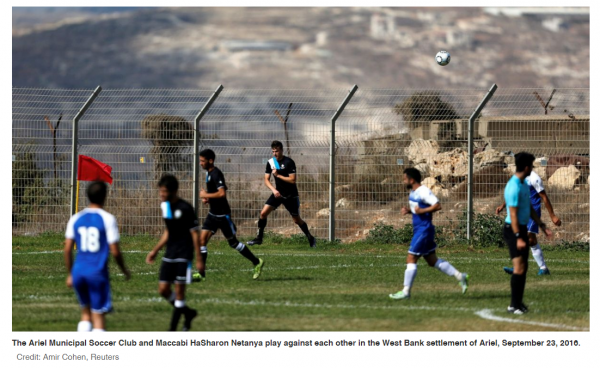
There was also another nice touch: Eini’s closing remarks thanking FIFA for welcoming Israel’s Football Association with honor and respect.
Eini made the key argument forcefully: the football pitch isn’t the place to adjudicate sovereignty claims.
But he might have devoted a few extra minutes to raising other problems with Rajoub’s remarks.
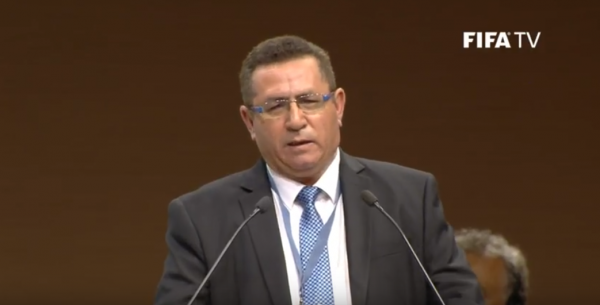
[IFA Chairman Ofer Eini addresses FIFA Congress | May 11, 2017 | Manama, Bahrain | Credit: YouTube screenshot]
Further, drawing on the work of Northwestern University Law Professor Eugene Kontorovich, Eini could have made the case that
there is simply no support in international law for prohibiting business in occupied territories.”
Additionally, while he did mention that “other countries like us” also have border conflicts that are best left outside of FIFA, Eini could have reminded the assembled member associations that Israel’s teams playing in the West Bank aren’t in a unique situation. That is, Eini could’ve better articulated that, by adopting the PFA’s motion, FIFA would be opening up a can of worms with regard to the territorial disputes of many other members, including Morocco vs. Western Sahara; Spain vs. Gibraltar; China vs. Taiwan; and the two Koreas.
Hey @hrw, how come you're not trying to kick N. Korea out of #FIFA? #LetIsraelPlay https://t.co/U4dxrNp1hw @EVKontorovich @FootCoolCorner
— Miriam F. Elman (@MiriamElman) May 8, 2017
As Kontorovich writes,
FIFA’s recognition of teams has never been understood as taking any position on the status of territory where the team plays.”
Lastly, and perhaps the greatest omission, was Eini’s failure to address Rajoub’s long history of using football to incite violence and promote hateful views of Israel. Eini missed the opportunity to condemn Rajoub for glorifying terrorist; naming soccer tournaments after mass-murderers of innocent Jews; and shutting down football matches between Israeli and Palestinian children.
As @FIFA meets, Palestinian Football Association glorifies terror https://t.co/wEEbOoRyAY#KickTerrorismOutOfFootball pic.twitter.com/6QogTMFEgt
— Pal Media Watch (@palwatch) May 9, 2017
Eini tells the Congress that he proposed in front of Rajoub and Sexwale’s committee that they should hold a football match between Palestinians and Israelis called the “match for peace” in which all proceeds should go toward building a “football school for Palestinians and Israelis.”
It’s a great idea, and it’s good that the Congress got to hear this Israeli proposal. But they should have also learned from Eini that the PFA’s Rajoub would never support it. That’s because he views these grassroots people-to-people interactions—especially those organized for Israeli and Palestinian kids—as “crimes against humanity.”
-
3:47:17—Infantino invites comments from the floor, recognizes Rajoub
Seeing no one among the assembled delegates with an interest in commenting further, Infantino begins to explain the Council’s decision but interrupts himself when he spots a delegate with a raised hand:
Who is it? Ah, Mr. Rajoub…Again…”
Infantino is clearly miffed that Rajoub is once more insisting on airtime, but he nonetheless allows him to have the last word.
-
3:47:57—Rajoub rebuts Eini’s remarks (approx. 3 minutes)
Calling Eini’s speech “passionate”, Rajoub launched into a bitter attack of his remarks. Much of this second diatribe merely repeated what he had already said.
But Rajoub also added something new: an incorrect assertion that the International Criminal Court has determined that Israeli settlements are a “war crime”.
ICC has not decided this. Another PLO fabrication. #FIFA https://t.co/bxRNipMTH7
— NGO Monitor (@NGOmonitor) May 11, 2017
It’s easy to miss, but Rajoub also turns Eini’s hope that football can serve as a bridge to bring Israelis and Palestinians together on its head. This is wrong according to Rajoub because according to his own twisted logic first there has to be “equity”, a “partnership”, and an end to the “occupier and occupied” situation and only then can Israelis and Palestinians meet.
By the end of this second harangue, Rajoub has gone off the rails and starts to wave a photo of “IDF soldiers with machine guns.” Unbelievably, he then takes Infantino himself to task for “not criticizing it.” It’s pretty clear that the exasperated FIFA president has heard more than enough from Rajoub about Israel’s “humiliation, racism and violence.”
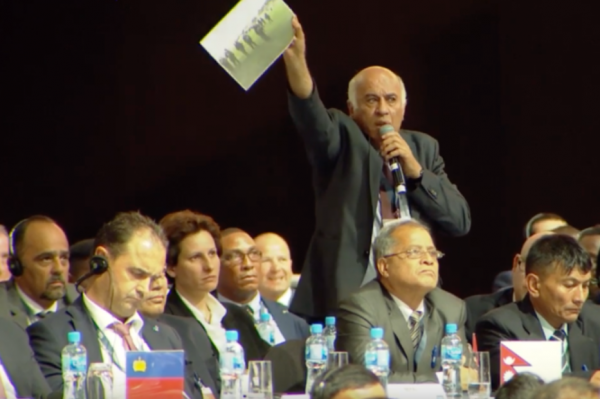
[PFA Chairman Jibril Rajoub | FIFA Congress floor | May 11, 2017 | Manama, Bahrain | Credit: YouTube screenshot]
At this point, Eini wisely doesn’t voice any interest in a counter-rebuttal.
-
3:50:19—Infantino explains the Council decision, is interrupted from the floor, recognizes the PFA’s lawyer
Referencing a slide displayed on the screen on stage, Infantino calmly explains the decision of the Council to put forward a motion to wait until Sexwale’s monitoring committee can deliver a final report (according to Infantino, the Council only heard an oral report).
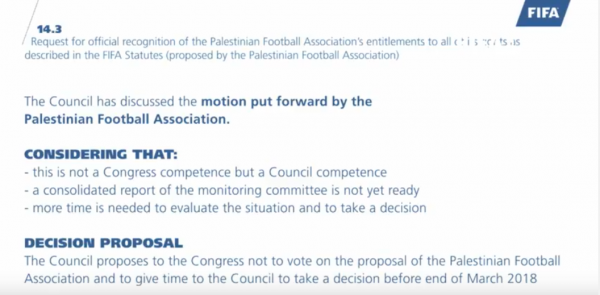
[Credit: YouTube screenshot]
In the middle of his remarks he’s distracted by someone trying to get his attention.
Turns out it’s the PFA’s legal counsel. Ever the gentleman in these proceedings, Infantino gives him the floor.
-
3:53:17—The PFA’s legal counsel presents a procedural complaint (approx. 3 minutes)
Speaking partly in broken English and partly in a perfect German, the PFA’s lawyer objected to the Council’s motion on procedural grounds. He said that instead of introducing a brand new motion, Infantino should be introducing an amendment. He insisted that, since they had presented it, the Congress should be voting on the PFA’s proposal, in “accordance with FIFA rules.”
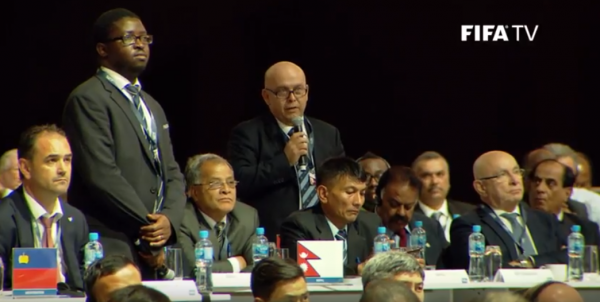
[PFA legal counsel raises procedural objection | FIFA Congress floor | May 11, 2017 | Manama, Bahrain | Credit: YouTube screenshot]
-
3:56:05—Infantino rejects the PFA’s complaint and calls on Congress to vote on the Council’s motion
It was a tense moment, but Infantino handled it masterfully.
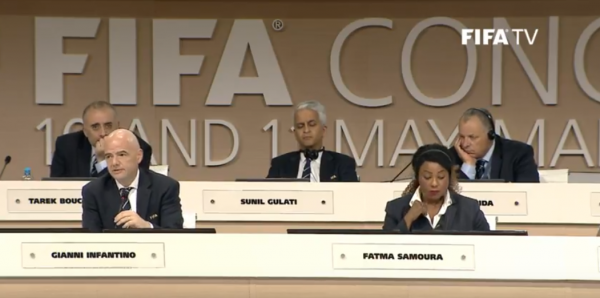
[Credit: YouTube screenshot]
-
3:56:50—FIFA’s Fatma Samoura presents the motion to a vote
Infantino directed Ms. Samoura to call for a vote on the Council’s motion. The suspense builds.
-
3:57:26—Member associations are given 15 seconds to register their votes electronically
A stop watch on the screen counts down the seconds.
-
3:58:07—Samoura announces the results of the vote
The Council motion to delay passes by a 138-50 margin.
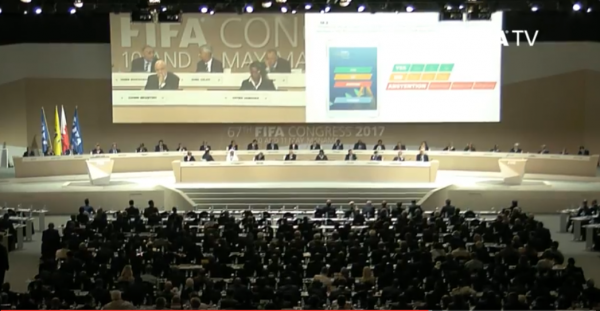
[Credit: YouTube screenshot]
-
3:58:40—Infantino moves to the next agenda item
Infantino promises verbally that the Council will make a decision in October 2017 and moves on to the next agenda item.
Fifa Congress: Gianni Infantino calls for more time to decide on the contentious Palestine – Israel issue; report is pending. Passed 138-50.
— David Conn (@david_conn) May 11, 2017
Analysis of the 67th FIFA Congress Decision on Israeli Settlement Soccer Clubs
The FIFA member associations that voted in Thursday’s Congress in support of the Council’s motion were obviously persuaded by FIFA President Infantino’s explanation during the meeting that it would be “premature” to take action until the decision making body had the time to assess a final report by the Monitoring Committee on Israel-Palestine.
It’s also entirely possible that some delegates were swayed more by Eini’s measured words than they were by Rajoub’s long-winded and near-hysterical diatribes.
They might also have been just as frustrated as Infantino appeared to be by Rajoub’s subsequent insistence that he be given the floor again (along with the interruption of the PFA’s lawyer, and his insinuation that Infantino and the Council were acting improperly).
That is, the PFA might have lost votes not because its arguments were perceived as having little merit but because of the perceived unprofessional way that the Palestinian delegation handled itself at the meeting.
But whatever the reasons that a majority of FIFA’s members on Thursday decided to delay a decision on the Israeli settlement teams, it’s an exaggeration to characterize what happened at FIFA as an Israeli “win” or a “victory.”

[Credit: Haaretz]
Indeed, had the PFA’s motion been brought to the floor for a vote, as the association’s legal counsel insisted it should, the outcome might have not gone in Israel’s favor. You be the judge after watching what went down at the Bahrain meeting. To my mind, it’s simply not the case that either the Council or the Congress now stands firmly on Israel’s side.
Basically what now looks like a loss for the Palestinians and their vehemently anti-Israel boycott-promoting affiliates may turn out to have been a blessing in disguise. That’s because, based on President Infantino’s emphatic closing remarks at Thursday’s Congress, the FIFA Council now appears committed to reaching a decision by October.
So Israel has been left with only a few months to up its game and present a convincing argument that the Palestinians are playing an “unsporting and illegal football war” against Israel.
Conclusion
Following FIFA’s decision this week, Israel’s critics have wasted no time in condemning the delay as a “failure” of FIFA’s commitment to human rights and as a “capitulation” to Israel.
.@FIFAcom President Infantino Hijacks Vote on Israeli Settlements https://t.co/f64Kbk8vnY #RedCardIsrael pic.twitter.com/wdsnIQONmn
— PACBI (@PACBI) May 11, 2017
.@FIFAcom President Infantino & Council working against Palestinian rights, Congress hijacked by Israeli bullying tactics #RedCardIsrael
— PACBI (@PACBI) May 11, 2017
Writing for the popular anti-Israel website Electronic Intifada, its co-founder Ali Abunimah charged that FIFA’s boss “rigged the vote for Israel.”
But the accusation that FIFA “caved in” to pressure brought to bear by a “personal phone call” from PM Netanyahu is baseless.
The reality, according to a report published earlier this week in Haaretz, is that Infantino is sympathetic to the PFA’s position. In fact, he told Netanyahu that under FIFA’s bylaws he couldn’t unilaterally remove the issue from the Congress agenda. He therefore suggested that Israel instead propose its own solution to the dispute which could then be discussed along with the Palestinian motion.
That is, neither Infantino nor the Council have expressed any hostility toward the PFA’s position.
Moreover, Netanyahu’s phone call probably did far more harm than good by giving Rajoub an opportunity in his address to repeatedly harp on the Israeli government’s supposed unseemly “illegal intervention” in the business of the Congress, thus deflecting attention from the substantive weaknesses of the PFA proposal.
Lastly, by insisting on a delay to await the final report by the ad-hoc monitoring committee headed by Tokyo Sexwale, Infantino and the Council are virtually ensuring that the proposal to give Israel an ultimatum—either stop playing soccer games in the settlements or sanctions will be imposed on the settlement teams or even on the IFA as a whole—is going to be taken up as a credible option for the Council’s consideration come October.
This is what Israel has feared all along would happen.
Bottom line: Will FIFA kick Israel out of world soccer by allowing the PFA and external anti-Israel advocacy groups to determine its rules of the game? Based on this week’s 67th FIFA Congress in Bahrain, that ball is still very much up in the air.
——————————————-
Miriam F. Elman is an Associate Professor of Political Science and the Robert D. McClure Professor of Teaching Excellence at the Maxwell School of Citizenship & Public Affairs, Syracuse University. She is the editor of five books and the author of over 60 journal articles, book chapters, and government reports on topics related to international and national security, religion and politics, and the Israeli-Palestinian conflict. She also frequently speaks and writes on the Boycott, Divestment, and Sanctions (BDS) anti-Israel movement. Follow her on Twitter @MiriamElman
 DONATE
DONATE
Donations tax deductible
to the full extent allowed by law.








Comments
Thanks for this piece. I didn’t know that the Paleos were going after Israel in FIFA but it doesn’t surprise me. Keep us informed!
Soccer is a 3rd world sport dominated by notoriously corrupt institutions like FIFA and even worse, the IOC. Booting Israel out of FIFA competition would have no effect on Israel but would seriously damage FIFA when many important members move on to form a new international organization to challenge them. That would immediately put FIFA into steep, irreversible decline.
FIFA is not the UN and so, it is not the proper venue for resolving these political disputes. If they care about FIFA, they will find a way to take this issue off of the table. Soccer and Israel will survive. FIFA may not. Personally, I don’t like soccer. It’s just “River Dance” with a ball. Z-z-z-z-z-z-z-z-z-z.
sorry Phil!
that was supposed to be an up vote.
i haven’t had the morning Coke yet… 😎
No problem. I just did the same thing earlier thinking I was hitting “reply”.
Israel should take up Australian Rules football as the national sport and tell the ghey soccer weenies to go pound sand up their collective 4th point of contact until they can all defecate a bottle.
Maybe we can start an international baseball league. Soccer sucks. I can’t despise it fast enough.
If they do ban Israel, we should ban FIFA recognized teams from the US.